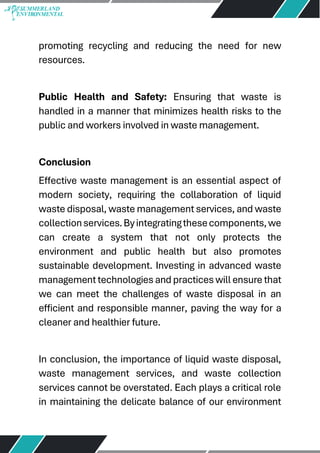3 Easy Facts About Reclaim Waste Explained
3 Easy Facts About Reclaim Waste Explained
Blog Article
Unknown Facts About Reclaim Waste
Table of ContentsIndicators on Reclaim Waste You Should KnowExamine This Report on Reclaim WasteAn Unbiased View of Reclaim WasteThe Of Reclaim WasteSome Known Incorrect Statements About Reclaim Waste
Residential sewage waste refers to the waste and products from a residential septic storage tank. The appropriate monitoring and disposal of residential sewage waste need liquid waste to be transferred to a sewer therapy plant where the proper methods and devices are used to detoxify and dispose of waste.
Commercial waste commonly consists of possible dangers, such as flammable products or a mix of liquid and strong waste items, and calls for a much more innovative and thorough disposal procedure. The disposal of commercial waste generally involves the filtering of waste prior to transport to make certain secure and proper disposal. Hazardous waste is developed from results and runoff of commercial processes and production.
This sort of waste can not make use of the exact same sewage management transport or procedures as septic or industrial fluids. The industrial waste management process calls for the inspection and testing of fluid waste before it undergoes the disposal procedure (liquid waste disposal melbourne). Drainage waste is the fluid waste that comes from runoff and excess stormwater in highly populated areas or cities
Drainage waste can create contamination and flooding if not handled correctly. Ensuring correct waste administration can avoid disasters and minimize environmental harm.
Some Known Incorrect Statements About Reclaim Waste
Get in touch with PROS Services today to discover concerning our waste administration and disposal solutions and the correct methods to take care of the fluid waste you produce.
(https://justpaste.it/fauht)Do you recognize what happens to your water when you draw the plug, flush the commode or drain pipes the cleaning device? No? Well, it deserves understanding. This supposed 'wastewater' is not only an essential resource yet, after treatment, will be launched to our land, rivers or the ocean. Used water from commodes, showers, bathrooms, kitchen sinks, washings and industrial procedures is called wastewater.

water made use of to cool down machinery or tidy plant and tools). Stormwater, a form of wastewater, is drainage that flows from agricultural and city locations such as roofings, parks, gardens, roadways, paths and rain gutters right into stormwater drains, after rainfall. Stormwater flows untreated straight to local creeks or rivers, eventually getting to the sea.
The Only Guide for Reclaim Waste
In Queensland, most wastewater is treated at sewage treatment plants. Wastewater is carried from residential or commercial sites with a system of sewage systems and pump stations, called sewage reticulation, to a sewer therapy plant. City governments build, keep and run most sewage therapy plants. Operators are accredited under the Environmental Protection Act 1994 to discharge cured wastewater at an appropriate ecological standard into waterways.
The Division of Natural Resources advises city governments regarding managing, operating and keeping sewerage systems and therapy plants. In unsewered locations, neighborhood federal governments may require householders to set view website up specific or home sewage treatment systems to deal with domestic wastewater from toilets, kitchens, bathrooms and laundries. The Division of Natural Resources authorises making use of home systems when they are verified to be effective.
A lot of stormwater receives no treatment. In some new communities, treatment of some stormwater to remove clutter, sand and crushed rock has begun using gross toxin traps. Wastewater treatment takes place in 4 stages: Removes solid matter. Larger solids, such as plastics and other things wrongly discharged to drains, are gotten rid of when wastewater is passed via screens.
Wastewater after that flows right into huge tanks where solids resolve and are removed as sludge. Oil and residue are skimmed from the surface. Uses small living organisms called micro-organisms to damage down and eliminate remaining liquified wastes and great fragments. Micro-organisms and wastes are integrated in the sludge. Eliminates nitrogen and phosphorus nutrients that could trigger algal blooms in our waterways and intimidate water life.
The Ultimate Guide To Reclaim Waste
Nutrient elimination is not readily available at all sewer therapy plants because it needs pricey specialist devices. Clear fluid effluent created after treatment might still consist of disease-causing micro-organisms - liquid waste removal.

This generally implies wastewater needs to be dealt with or contaminants gotten rid of prior to it can be discharged to waterways. Many wastewater moves right into the sewerage system. Under the Act, regional federal governments administer authorizations and licences for eco pertinent activities (Ages) entailing wastewater launches that could have a local impact. The department carries out approvals and permits to ERAs involving wastewater releases that may have a local or statewide influence.
Getting My Reclaim Waste To Work
Or else, examples are considered lab evaluation. Often lots of examinations are needed to develop the levels of each of the different toxins such as oils, hefty steels and pesticides in water. Surveillance supplies accurate info concerning water top quality and can confirm that permit conditions are being satisfied. The information acquired with monitoring supplies the basis for making water top quality choices.
Report this page